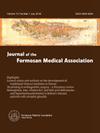Efficacy of jing Si herbal tea in functional dyspepsia: A double-blind, randomized, placebo-controlled study.
IF 2.6
3区 医学
Q1 MEDICINE, GENERAL & INTERNAL
引用次数: 0
Abstract
BACKGROUND Functional dyspepsia (FD) is prevalent worldwide and is associated with gastrointestinal inflammation, mucosal anomalies, and shifts in microbiota metabolites like short chain fatty acids. This study assesses the efficacy of Jing Si herbal tea (JSHT) in alleviating FD symptoms, psychological distress, and influencing metabolites. METHODS Adults with FD based on Rome IV criteria were included. Participants underwent physical and psychological evaluations, pre-treatment blood sampling, and were randomly assigned to JSHT or placebo groups for four weeks. Post-treatment, evaluations and Liquid Chromatography-Mass Spectrometry for gut metabolites were done. Successful response was defined by a 50% symptom reduction. Symptom intensity, sleep, depression, anxiety, and stress were measured using questionnaires. RESULTS 26 patients (median age 55.5 years, range 22-77 years, 60.6% female) were studied. Both JSHT and placebo groups were similar at baseline. JSHT showed a higher response rate (69.2%) than placebo (23.1%, P = 0.018). JSHT recipients experienced notable reduction in upper gastrointestinal symptoms and anxiety (P = 0.005; P = 0.037). Increased serum butyrate was observed in improved patients (P = 0.01), whereas no major changes were detected in the placebo group. CONCLUSION Four weeks of JSHT treatment ameliorated FD symptoms and anxiety, potentially linked to increased serum butyrate. This study suggests that JSHT has potential therapeutic role in patients with FD.京四凉茶对功能性消化不良的疗效:一项双盲、随机、安慰剂对照研究。
背景功能性消化不良(FD)在全球普遍存在,与胃肠道炎症、粘膜异常和短链脂肪酸等微生物群代谢物的变化有关。本研究评估了静思凉茶(JSHT)在缓解 FD 症状、心理压力和影响代谢物方面的功效。参与者接受身体和心理评估、治疗前抽血,并被随机分配到 JSHT 或安慰剂组,为期四周。治疗后进行评估,并用液相色谱-质谱法检测肠道代谢物。成功应答的定义是症状减轻 50%。研究对象为 26 名患者(中位年龄 55.5 岁,22-77 岁,60.6% 为女性)。JSHT 组和安慰剂组的基线相似。JSHT 的应答率(69.2%)高于安慰剂(23.1%,P = 0.018)。JSHT 受试者的上消化道症状和焦虑明显减轻(P = 0.005;P = 0.037)。结论4 周的 JSHT 治疗可改善 FD 症状和焦虑,这可能与血清丁酸盐的增加有关。这项研究表明,JSHT 对 FD 患者具有潜在的治疗作用。
本文章由计算机程序翻译,如有差异,请以英文原文为准。
求助全文
约1分钟内获得全文
求助全文
来源期刊
CiteScore
6.50
自引率
6.20%
发文量
381
审稿时长
57 days
期刊介绍:
Journal of the Formosan Medical Association (JFMA), published continuously since 1902, is an open access international general medical journal of the Formosan Medical Association based in Taipei, Taiwan. It is indexed in Current Contents/ Clinical Medicine, Medline, ciSearch, CAB Abstracts, Embase, SIIC Data Bases, Research Alert, BIOSIS, Biological Abstracts, Scopus and ScienceDirect.
As a general medical journal, research related to clinical practice and research in all fields of medicine and related disciplines are considered for publication. Article types considered include perspectives, reviews, original papers, case reports, brief communications, correspondence and letters to the editor.

 求助内容:
求助内容: 应助结果提醒方式:
应助结果提醒方式:


